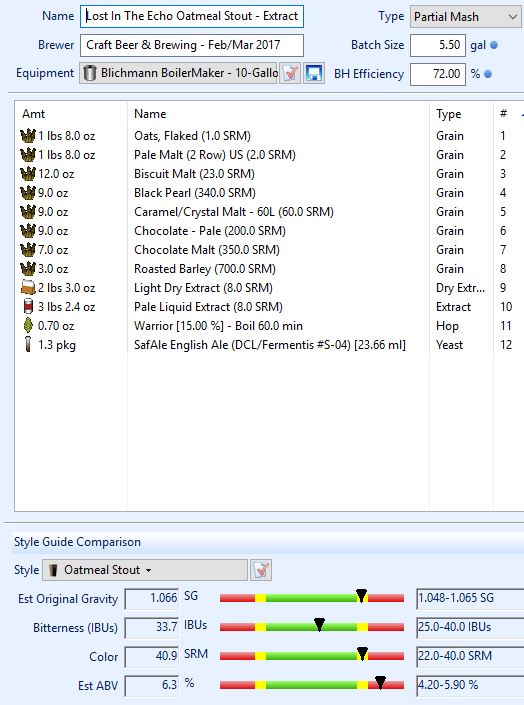Good catch on both of those. BeerSmith 2 really altered this recipe! Normally the magazines provide both all-grain and extract versions, so I usually don't have to convert them.
The conversion kicked up the Caramel to 1.17 lb, and changed it from 60L to 20L (I missed that too), and removed the oats and biscuit. Do you think I could go with the original amounts of specialty grains? Then add 1.5 lb 2-row for the mini-mash? And if I keep the 9 oz Caramel 60L (from the original recipe), should I include that in the mini-mash or the steep?
I created a recipe with the original specialty grains, added 1.5 lb 2-row and adjusted the DME and LME to hit the 5.9 Est ABV (see attached). As a test, I removed the two chocolate malts and the roasted barley from the recipe, which dropped the Est ABV by 0.4%.
I have no idea if I can hit the default 72% efficiency, but based on that, I removed one entire container of LME and added a little more DME to hit 6.3% Est ABV (again, the extra 0.4% is to account for only steeping the chocolate malts and roasted barley).
I might kick the hops up a tad, but the original recipe only uses Warrior, and has an IBU of 35. I'll adjust my starting volume accordingly, but I usually boil off a gallon or so in an hour. I also tweak my burner a little, depending on how the boil-off goes.
Thank you very much for all the effort you're putting into this!
Beersmith is pretty good in that regard. Just don't trust those conversions.
Best is to reformulate using brewing knowledge and only change what needs to be changed. The oats make it a little more complex as you need to add the 2-row for conversion. For example, your dark grain charge remains unaltered, unless you want a little more or less of this or that, because that's your preference or today's take on it.
Your C60 goes in the mash. You should have no problems getting 72% efficiency, it's likely a bit higher, in the 80s.
==> What kind of water are you using?
Dark malts like that add very little
fermentable sugars, but don't be fooled, there are lots of (caramelized) sugars in there, adding color and those yummy flavor compounds. That's why they don't change the ABV much.
You can add a flavor hop late in the boil or after flameout and let it steep for 5-10 minutes. Although Warrior is fairly neutral, and doesn't lend a ton of flavor after a 60 minute boil, she does present her character. You know there are hops in there, they're just not very fragrant.
That gallon you boiled off will then be easily replaced with the steeped dark potion.
I just wanted to make sure you would have enough space in your boil kettle to add that gallon at the
185F point to pasteurize it. Reason is, the gallon of cooled dark liquid will drop your wort temps down at least 10-15 degrees, so make sure not to cool it down too much before adding it. Keep in mind, you need it to be 165F or above for pasteurization!
To answer your previous question I missed, there are some notable differences in the results when mashing or steeping specialty malts, as you said, mostly due to (lack of) starch conversion. For crystal malts and darker roasts the difference is none or negligible. For the other malts it can be quite pronounced, especially when a load of starch is released without a chance of conversion, or mash enzymes are needed to help break up cellular structures to extract the goodies inside.
As I said before, 1 packet of S-04 is plenty, rehydrated, no need for 1.3. Try to aerate/oxygenate your wort as well as you can when pitching the yeast slurry.
Good fortune with your brew!




![Craft A Brew - Safale BE-256 Yeast - Fermentis - Belgian Ale Dry Yeast - For Belgian & Strong Ales - Ingredients for Home Brewing - Beer Making Supplies - [3 Pack]](https://m.media-amazon.com/images/I/51bcKEwQmWL._SL500_.jpg)






















































